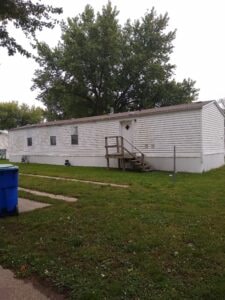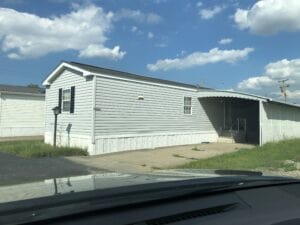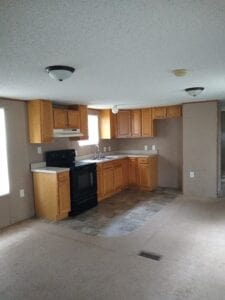Did you know that heating a mobile home can be up to 30% more challenging than heating a traditional house? With their unique construction and often limited insulation, mobile homes require special considerations. When it comes to efficient heating for mobile homes there are steps you should take to make this most efficient. In this article we will discuss all types of steps you can take today to get started.
Efficient Heating for Mobile Homes
Efficient heating is crucial for maintaining a cozy living space while keeping utility bills in check. We’ll discuss various heating options specifically designed for mobile homes, including electric furnaces, gas furnaces, heat pumps, and wood-burning stoves. Each option has its pros and cons, so we’ll break down the key factors to consider when choosing the best solution for your specific needs.

Stay tuned as we dive into the world of mobile home heating solutions and empower you with the knowledge to create a warm and inviting environment within your cozy abode.
Different Heating Systems For Efficient Heating For Mobile Homes
Electric Furnaces: Efficient Heating for Mobile Homes
Electric furnaces are a popular choice for heating mobile homes due to their efficiency and ease of installation. These furnaces use electricity to generate heat, which is then distributed throughout the home via ductwork. One of the advantages of electric furnaces is that they can be installed in any location within the mobile home, making them versatile.
However, it’s important to consider the cost of operating an electric furnace. Electricity rates can vary, and depending on your region, it may be expensive to keep your mobile home warm during colder months. This could lead to higher utility bills compared to other heating options.
Pros:
-
Efficient and easy to install
-
Versatile placement options within the mobile home
Cons:
-
Can be costly to operate due to electricity rates
Wood-Burning Stoves: Efficient Heating for Mobile Homes
Wood-burning stoves offer an affordable heating option for mobile homeowners. These stoves burn wood logs or pellets, generating heat that radiates throughout the space. They provide a cozy ambiance and can be an excellent backup heating source during power outages.
One key consideration when using a wood-burning stove is regular maintenance. It’s essential to clean the stove regularly and ensure proper ventilation for safe operation. You’ll need a reliable source of firewood or pellets, which may require additional effort and cost.
Pros:
-
Affordable option for mobile homeowners
-
Provides warmth and cozy ambiance
Cons:
-
Requires regular maintenance and proper ventilation
-
Need a steady supply of firewood or pellets
Read more on our article: Mobile Home Approved Wood Stoves: Installation & Top Picks
Heat Pumps: Efficient Heating For Mobile Homes
Heat pumps are another popular choice for heating mobile homes as they offer both heating and cooling capabilities. These systems work by transferring heat from one area (either inside or outside) to another using refrigerant coils.
One significant advantage of heat pumps is their energy efficiency. They can extract heat from outdoor air even in colder temperatures, making them suitable for regions with mild winters. Heat pumps are also quieter compared to other heating systems and provide consistent temperature control throughout the mobile home.
Pros:
-
Energy-efficient choice for mobile homes
-
Provides both heating and cooling capabilities
-
Quiet operation and consistent temperature control
Cons:
-
May not be suitable for regions with extremely cold winters
By considering these different heating systems, you can choose the option that best suits your needs, budget, and climate. Electric furnaces offer efficiency and easy installation but may come with higher operating costs. Wood-burning stoves provide an affordable option but require regular maintenance and proper ventilation. Heat pumps are energy-efficient and versatile but may not be suitable for extremely cold climates.

Remember to assess your specific requirements, consult professionals if needed, and weigh the pros and cons of each system before making a decision.
Cost-Efficient Heating For Mobile Home Options
Programmable Thermostats
Save money on your utility bills by investing in a programmable thermostat for your mobile home. These nifty devices automatically adjust the temperature settings based on your schedule, ensuring that you’re not wasting energy when you’re away or asleep. With programmable thermostats, you can set different temperatures for various times of the day, allowing you to maintain a comfortable environment while optimizing energy efficiency.
Pros:
Saves money by reducing unnecessary heating
Convenient and easy to use
Can be programmed to align with your daily routine
Some models offer smart features that allow remote control via smartphone apps
Cons:
Requires initial investment in the thermostat itself
May take some time to understand and program properly
Insulation Upgrades
Improving insulation in your mobile home is another effective way to heat it more efficiently. Proper insulation helps reduce heat loss through walls, floors, and ceilings, keeping your home warmer for longer periods. By minimizing drafts and air leaks, insulation upgrades can significantly decrease energy consumption and lower your heating bills.
Pros:
Reduces heat loss and increases comfort levels
Lowers energy bills in the long run
Helps maintain consistent indoor temperature
Provides soundproofing benefits as well
Cons:
Initial cost of insulation materials and installation may be high
Professional installation may be required for certain types of insulation
Zone Heating: Efficient Heating For Mobile Homes
Zone heating is an excellent option if you want to save on energy costs by only heating the rooms you use frequently. Instead of maintaining a uniform temperature throughout your entire mobile home, zone heating allows you to focus on specific areas where warmth is needed most. This approach can help prevent wasted energy in unoccupied rooms.
Pros:
Energy-efficient as it targets specific areas instead of the whole house
Allows customization according to individual preferences
Can be achieved through various methods such as space heaters or ductless mini-split systems
Cons:
Requires careful planning and consideration of heating needs in different zones
May involve additional upfront costs for purchasing and installing zone heating equipment
By implementing these cost-efficient heating options, you can effectively heat your mobile home while keeping energy bills under control. Programmable thermostats, insulation upgrades, and zone heating strategies offer practical ways to improve energy efficiency and reduce heat loss. Remember to choose energy-efficient appliances such as electric furnaces or heat pumps with a high efficiency rating or Energy Star certification to maximize savings.
Tips For Winterizing and Insulating a Mobile Home
To ensure your mobile home stays warm during the winter months, it’s crucial to take steps to seal air leaks and improve insulation. By following these tips, you can create a cozy and energy-efficient living space.
Seal Air Leaks
Air leaks around windows, doors, and electrical outlets can lead to drafts that make it difficult to keep your mobile home warm. Take the time to inspect these areas and seal any gaps or cracks you find. Here are some methods you can use:
Weatherstripping: Install weatherstripping around windows and doors to create a tight seal. This will help prevent cold air from seeping in and warm air from escaping.
Caulk: Use caulk to fill in gaps around windows, doors, and electrical outlets. This will further reduce drafts and improve energy efficiency.
Add Insulation
Insulation is key. By adding insulation to the attic, walls, floors, and underbelly of your home, you can significantly improve its ability to retain warmth. Consider the following options:
Attic Insulation: Adding insulation in the attic helps prevent heat loss through the roof. Use insulation with an appropriate R-value for optimal effectiveness.
Wall Insulation: If possible, install insulation within the walls of your mobile home. This will help maintain a consistent temperature throughout the interior.
Floor Insulation: Insulating the floors can prevent cold air from rising into your living space. You can use fiberglass batts or rigid foam insulation for this purpose.
Underbelly Insulation: The underbelly of your mobile home is often exposed to cold air currents. Applying insulation here can help protect against heat loss.
By properly insulating your mobile home, you’ll not only keep it warmer during winter but also reduce heating costs over time.
Additional Tips: Efficient Heating For Mobile Homes
In addition to sealing air leaks and adding insulation, here are a few more tips to help you effectively heat your mobile home:
Use Draft Stoppers: Place draft stoppers at the bottom of doors and windowsills to prevent cold air from entering. This simple solution can make a noticeable difference in maintaining warmth.
Consider Window Treatments: Use heavy curtains or thermal blinds on windows to provide an extra layer of insulation against the cold.
Utilize Space Heaters: Supplement your main heating system with energy-efficient space heaters in frequently used rooms. This allows you to focus heat where it’s needed most while reducing overall energy consumption.
Remember, keeping your mobile home warm during winter requires a combination of sealing air leaks, adding insulation, and implementing additional heating strategies. By taking these steps, you’ll create a comfortable living environment that saves on energy costs.

Optimizing Control Systems for Efficient Heating
Install a smart thermostat for precise temperature control and energy savings
One of the most effective ways to optimize the heating system in your mobile home is by installing a smart thermostat. Unlike traditional thermostats, smart thermostats allow for precise control over the temperature settings, resulting in increased energy efficiency and cost savings.
With a smart thermostat, you can easily program different temperature settings throughout the day to match your schedule. For example, you can set lower temperatures during periods when the mobile home is unoccupied or at night when everyone is asleep. This setback temperature not only saves energy but also ensures that you come back to a comfortably warm home without wasting unnecessary heat.
Smart thermostats also offer additional features such as remote control through smartphone apps. This means that even if you forget to adjust the temperature before leaving your mobile home, you can do it remotely from anywhere with an internet connection. This feature comes in handy when unexpected changes in plans occur or if you want to ensure a cozy environment upon returning home.
Utilize setback temperatures during periods when the home is unoccupied or at night when everyone is asleep
Setting setback temperatures during periods of non-use or sleep can significantly reduce energy consumption and utility bills. By lowering the temperature by just a few degrees during these times, you can save a substantial amount of energy without sacrificing comfort.
During the winter months, consider setting back the temperature while you’re away at work or school. You won’t notice much difference in comfort levels, but your heating system will work less frequently, resulting in significant energy savings over time. Similarly, adjusting the temperature down slightly overnight while everyone is sleeping can lead to considerable cost reductions without compromising warmth.
Consider using a zoning system to independently control temperatures in different areas of the mobile home
If your mobile home has multiple rooms or areas with varying heating needs, implementing a zoning system can be highly beneficial. A zoning system allows you to independently control the temperature in different zones or areas of your home, ensuring optimal comfort and energy efficiency.
By dividing your mobile home into separate zones, you can set different temperature levels for each area based on individual preferences and usage patterns. For instance, you may want the living room to be warmer during the day while keeping the bedrooms cooler. With a zoning system, you have the flexibility to customize heating settings according to specific requirements, maximizing comfort while minimizing energy waste.
Zoning systems typically rely on dampers installed within the ductwork that regulate airflow to different zones. These dampers open and close as needed, directing heated air only where it is required. This targeted approach ensures that energy is not wasted on heating unoccupied spaces or rooms with lower heating demands.
Servicing and Maintaining Your Heating System
Schedule Regular Maintenance Checks
To ensure optimal performance of your heating system in a mobile home, it is crucial to schedule regular maintenance checks by a professional technician. These HVAC experts have the knowledge and experience to identify any potential issues and address them before they become major problems. By staying on top of routine maintenance, you can prevent breakdowns during the colder months when you need your heating system the most.
Maintain Clean Air Filters Regularly
One simple yet effective way to improve airflow efficiency in your mobile home’s heating system is by regularly maintaining clean air filters. Over time, dust, dirt, and debris can accumulate in the filters, obstructing airflow and reducing the system’s efficiency. By cleaning or replacing these filters as recommended by the manufacturer or HVAC technician, you can ensure that heated air flows freely throughout your home.
Inspect Ductwork for Leaks or Damage
Another important aspect of maintaining an efficient heating system in a mobile home is inspecting the ductwork for leaks or damage. Over time, ducts can develop cracks or holes that allow heated air to escape before reaching its intended destination. This not only reduces the effectiveness of your heating but also wastes energy and increases utility bills. Regularly inspecting and sealing any leaks or repairing damaged ductwork will help maximize heat distribution throughout your home.
Read more on our article: Sealing Mobile Home Ductwork: Benefits & Cost
Professional Repairs When Needed
If you notice any issues with your mobile home’s heating system such as strange noises, inconsistent temperatures, or reduced airflow, it is essential to seek professional repairs promptly. Attempting DIY fixes without proper knowledge and expertise may lead to further damage or even safety hazards. HVAC technicians have specialized tools and training to diagnose and repair various issues with different types of heating systems efficiently.
Additional Tips for Homeowners
In addition to regular maintenance checks and addressing repairs promptly, there are some other tips homeowners can follow to optimize their mobile home’s heating system:
Keep the area around your heating unit clear of any obstructions to ensure proper airflow.
Consider upgrading to a programmable thermostat that allows you to set different temperatures for different times of the day, maximizing energy efficiency.
Insulate your mobile home properly to prevent heat loss and improve overall energy efficiency.
Use ceiling fans in reverse mode during winter months. This helps circulate warm air throughout the room, making it feel more comfortable.
By implementing these tips and staying proactive with maintenance and repairs, you can ensure that your mobile home’s heating system operates efficiently and keeps you warm during the colder seasons.
Exploring Natural Gas and Propane Furnace Options
If you’re looking to heat your mobile home efficiently and effectively, it’s important to consider the different furnace options available. Two popular choices are natural gas furnaces and propane furnaces. Let’s dive into the pros and cons of each to help you make an informed decision.
Natural Gas Furnaces: Cost-Effective and High-Efficiency
Natural gas furnaces are known for their cost-effective operation and high-efficiency ratings. Here are some key points to consider:
Cost-Effectiveness: Natural gas is often more affordable than other fuel sources, making it a budget-friendly option for heating your mobile home.
High Efficiency: Natural gas furnaces have high Annual Fuel Utilization Efficiency (AFUE) ratings, which indicate how efficiently they convert fuel into heat. These ratings can range from 80% to 98%, with higher ratings representing better efficiency.
Reliable Heat Source: Natural gas is delivered through pipelines directly to your home, ensuring a consistent supply of fuel without the need for storage tanks or refills.
Lower Environmental Impact: Natural gas is considered a cleaner-burning fuel compared to other options like oil or coal, resulting in lower greenhouse gas emissions.
However, there are some considerations when it comes to natural gas furnaces:
Availability: Not all areas have access to natural gas pipelines, so it’s essential to check if this option is available in your location.
Installation Costs: Installing a natural gas furnace may require professional assistance and initial setup costs.
Safety Measures: While natural gas is generally safe when handled correctly, it’s crucial to ensure proper installation, maintenance, and regular inspections for any potential leaks or hazards.
Propane Furnaces: Reliable Heating for Off-Grid Mobile Homes
Propane furnaces offer an alternative solution for heating off-grid mobile homes. Here’s what you need to know:
Suitable for Off-Grid Living: If your mobile home is not connected to natural gas pipelines, propane furnaces can provide reliable heating without the need for a direct fuel supply.
Versatile Fuel Source: Propane is available in portable tanks that can be easily refilled or exchanged when needed, making it convenient for mobile homeowners.
Efficient Heating: Propane furnaces also have high AFUE ratings, ensuring efficient heat production and distribution throughout your mobile home.
Safety Considerations: It’s important to handle propane with caution due to its flammable nature. Regular maintenance and inspection of the furnace, gas valve, firebox, pilot light, and drafts are necessary to ensure safety.
However, there are a few factors to keep in mind when considering propane furnaces:
Fuel Costs: Propane prices can fluctuate depending on market conditions and availability in your area. It’s essential to consider the long-term cost implications before making a decision.
Storage Space: Propane tanks require storage space outside your mobile home. You’ll need to allocate an area for these tanks while ensuring proper ventilation and safety measures.
When choosing between natural gas and propane furnaces for your mobile home, consider factors such as availability, cost-effectiveness, environmental impact, and whether you’re on or off-grid.
Remember that both options provide reliable heating solutions; it ultimately depends on your specific needs and circumstances. Consulting with professionals or experienced homeowners can also help you make an informed decision based on their expertise and firsthand experiences.
Efficient Heating for Mobile Homes: Conclusion
In conclusion, heating a mobile home efficiently and cost-effectively is crucial for your comfort during the colder months. By exploring different heating systems such as electric furnaces, wood stoves, or heat pumps, you can find the option that best suits your needs and budget. Remember to winterize and insulate your mobile home to prevent heat loss and optimize energy efficiency. Regular servicing and maintenance of your heating system will ensure its longevity and performance.
To make the most of your heating system, consider optimizing control systems like programmable thermostats or smart thermostats. These allow you to regulate temperature settings according to your schedule and preferences. Just like maintaining a well-oiled machine, taking care of your heating system will keep it running smoothly and efficiently.
Now that you have a better understanding of how to heat a mobile home effectively, it’s time to take action. Assess your current heating setup, make necessary upgrades or adjustments, and enjoy a cozy living space throughout the winter months.
Efficient Heating for Mobile Homes: FAQs
Can I install a central heating system in my mobile home?
Yes, it is possible to install a central heating system in a mobile home. However, it requires professional installation due to the specific requirements of mobile homes. Consult with HVAC experts who specialize in mobile homes for guidance on choosing the right central heating system for your specific model.
Are there any grants or financial assistance available for upgrading my mobile home’s heating system?
Yes, there are various grants and financial assistance programs available for upgrading your mobile home’s heating system. Research local government initiatives or contact energy efficiency organizations in your area to inquire about potential funding opportunities.
Can I use solar panels to power my mobile home’s heating system?
Yes, solar panels can be used to power certain types of electric heaters or heat pumps in a mobile home. However, the feasibility depends on factors such as sunlight exposure and available roof space. Consult with solar energy experts to determine if solar panels are a viable option for your mobile home.
How often should I service my mobile home’s heating system?
It is recommended to service your mobile home’s heating system at least once a year. Regular maintenance will ensure optimal performance, prevent breakdowns, and extend the lifespan of your heating equipment. Schedule professional inspections and cleanings before the start of each heating season.
Can I use a portable electric heater as the primary heat source in my mobile home?
While portable electric heaters can provide supplemental heat, they are not typically suitable as the primary heat source in a mobile home. Mobile homes require more substantial heating systems to effectively warm the entire space. Consider installing a permanent heating solution that is specifically designed for mobile homes for better efficiency and comfort.
You might also be interested in our other articles:
Mobile Home Appraisal: A Complete Guide

